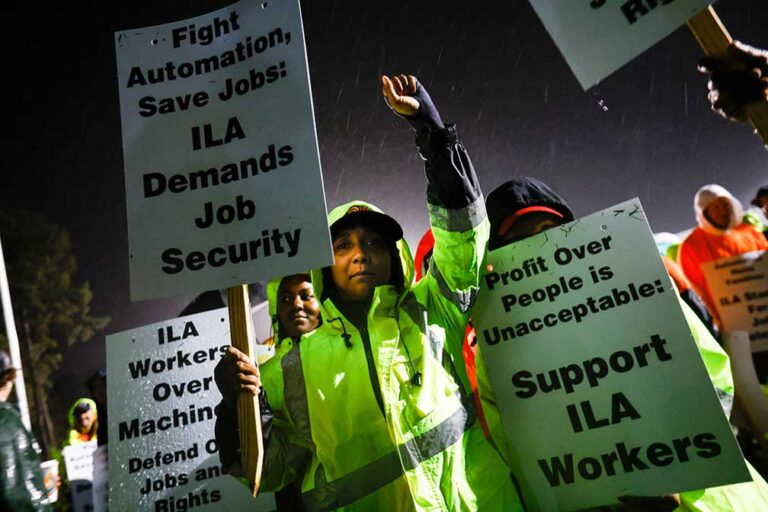PHILADELPHIA — The 45,000 dockworkers who went on strike Tuesday, Oct. 1 — for the first time in decades — at 36 U.S. ports from Maine to Texas may wield the upper hand in their standoff with port operators over wages and the use of automation.
Organized labor enjoys rising public support and has had a string of recent victories in other industries, in addition to the backing of the pro-union administration of President Joe Biden. The dockworkers’ negotiating stand is likely further strengthened by the nation’s supply chain of goods being under pressure in the aftermath of Hurricane Helene, which has coincided with the peak shipping season for holiday goods.
The union is also pointing to shipping companies’ record profits, which have come in part because of shortages resulting from the pandemic, and to a more generous contract that West Coast dockworkers achieved last year. The longshoremen’s workloads also have increased, and the effects of inflation have eroded their pay in recent years.
In addition, commerce into and out of the U.S. has been growing, playing to the union’s advantage. Further enhancing its leverage is a still-tight job market, with workers in some industries demanding, and in some cases receiving, a larger share of companies’ outsize profits.
“I think this work group has a lot of bargaining power,” said Harry Katz, a professor of collective bargaining at Cornell University. “They’re essential workers that can’t be replaced, and also the ports are doing well.”
The dockworkers’ strike, their first since 1977, could snarl supply chains and cause shortages and higher prices if it stretches on for more than a few weeks. Beginning after midnight, the workers walked picket lines Tuesday and carried signs calling for more money and a ban on automation that could cost workers their jobs.
Experts say consumers won’t likely notice shortages for at least a few weeks, if the strike lasts that long, though some perishable items such as bananas could disappear from grocery stores — although at this time of year, most other fruits and vegetables are domestically grown and not processed at ports, according to Alan Siger, president of the Produce Distributors Association.
In anticipation of a strike, most major retailers also stocked up on goods, moving ahead shipments of holiday gift items.
The strike, coming weeks before a tight presidential election, could also become a factor in the race if shortages begin to affect many voters. Pressure could eventually grow for the Biden administration to intervene to try to force a temporary suspension of the strike.
Little progress was reported in the talks until just hours before the strike began at 12:01 a.m. The U.S. Maritime Alliance, the group negotiating for the ports, said both sides did budge from their initial positions. The alliance offered 50% raises over the six-year life of the contract. Comments from the union’s leadership had briefly suggested a move to 61.5%, but the union has since signaled that it’s sticking with its initial demand for a 77% pay increase over six years.
“We have demonstrated a commitment to doing our part to end the completely avoidable ILA strike,” the alliance said Tuesday. The ports’ pay offer is more than every other recent union settlement, the group said.
“We look forward to hearing from the Union about how we can return to the table and actually bargain, which is the only way to reach a resolution,” the statement said.
In early picketing, workers outside the Port of Philadelphia walked in a circle and chanted, “No work without a fair contract.” The union posted message boards on the side of a truck reading: “Automation Hurts Families: ILA Stands For Job Protection.”
Boise Butler, president of the union local, asserted that the workers want a contract that doesn’t allow for the automation of their jobs. The shipping companies, he argued, made billions during the pandemic by charging high prices.
“Now,” Butler said, “we want them to pay back. They’re going to pay back.”
And in New Orleans, Henry Glover Jr., a fourth-generation dockworker who is president of the union local, said he can recall the days when longshoremen unloaded 150-pound sacks of sugar by hand. He acknowledges that machinery has made the job easier, but he worries that the ports need fewer people to handle the equipment.
“Automation could be good, but they’re using it to kill jobs,” Glover said. “We don’t want them to implement anything that would take our jobs out.”
William Brucher, an assistant professor of labor studies and employment relations at Rutgers University, noted that “this is a very opportune time” for striking workers.
The contract agreement reached last year with West Coast dockworkers, who are represented by a different union, shows that “higher wages are definitely possible” for the longshoremen and has enhanced their bargaining power, Brucher said.
Under the Taft-Hartley Act, Biden could seek a court order for an 80-day cooling-off period that would end the strike at least temporarily, but he has told reporters that he wouldn’t take that step. The administration could risk losing union support if it exercised such power, which experts say could be particularly detrimental for Democrats ahead of next month’s election.
On Tuesday, the White House continued to ask the alliance to negotiate a fair contract that reflects the longshoremen’s contribution to the economy.
“As our nation climbs out of the aftermath of Hurricane Helene,” Biden said in a statement, “dockworkers will play an essential role in getting communities the resources they need. Now is not the time for ocean carriers to refuse to negotiate a fair wage for these essential workers while raking in record profits.”
Ben Nolan, a transportation analyst with Stifel, said the administration isn’t likely to intervene until consumers start to see empty shelves or can’t find critical goods like medicines.
“Medications and other things come in on containers,” Nolan said. “I think if the administration wanted to have a reason to get involved, it’s stuff like that.”
By Tom Krisher, Wyatte Grantham-Philips and Tassanee Vejpongsa, The Associated Press. Krisher reported from Detroit, Grantham-Philips from New York. Associated Press journalists Ben Finley in Norfolk, Virginia, Jack Brook in New Orleans, Anne D’Innocenzio and Mae Anderson in New York, Dee-Ann Durbin in Detroit, Josh Boak in Washington, and Annie Mulligan in Houston contributed to this report.
The Associated Press is an independent global news organization dedicated to factual reporting. Founded in 1846, AP today remains the most trusted source of fast, accurate, unbiased news in all formats and the essential provider of the technology and services vital to the news business. The Trucker Media Group is subscriber of The Associated Press has been granted the license to use this content on TheTrucker.com and The Trucker newspaper in accordance with its Content License Agreement with The Associated Press.
















These workers are so naive. If they stay off the job for an extended period of time, they will never recoup their lost wages. The damage they are doing to all Americans is going to cost this nation upwards of $5 billion per day. If you think inflation is bad now, wait until these ignorant fools finally get done with this strike. Every penny they gain will only mean higher costs for everyone. It doesn’t take a college education to figure this out, only commonsense.
Look at how the top level of this union lives. Forget about them parading around trying to look like a lower middle class working man, that’s their costumes to try to fit in to their mob. It only takes a minute of research to see that he makes far more than the members, and lives a lifestyle of the rich and famous.
And the aggregate of the companies operating these docks aren’t without fault. Yes there is problems that they created, but the stockholders are the people who actually own many of these companies. who are they? They are often ordinary retirees or folks contributing money into a 401K. Their money is fed into various holdings that pressure these businesses to create profits.
In essence, we as Americans are cutting our own throats by our own ignorant greed. It will only take a few of these out of control unions with foolish demands to be the second leg of a tippy barstool. UT add a bunch oh of unelected bureaucrats placing politically inspired regulations and demands on commerce, and they will knock that stool over a cliff! Like it or not, this isn’t the first time in our history. we have an administration who are proven to fall asleep at the wheel at every level of government. the Commerce Secretary stated herself that she hasn’t given this strike much thought. Folks we need to hold them all accountable.